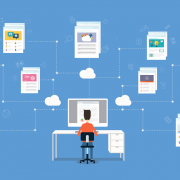How to Stay Safe Online
Just as technology develops day by day, and it becomes easier for individuals to browse and enjoy the online world, so does the cybercriminal world develop, too. The more technology progresses, the more hackers and other criminals are finding new ways to put online users at risk. Knowing how to stay safe online is paramount, but it’s also crucial to continue your safety learning and make it an ongoing priority.
You may believe you’re staying safe online by the basic methods, but the sad fact is that cybercriminals can be extremely creative when it comes to online crime, and even the most cautious of online users can fall victim to a trap. With this in mind, here’s an overview of how to stay safe online — and ensure that you continue to do so.
Set Up Your Firewall and Antivirus Software
If you’re going to be using the internet in any capacity, installing firewall and antivirus programs is always a fundamental place to start, and even better if you can install across all devices. This will set up your much-needed foundation for internet security and help to keep your browsing habits and your devices protected.
Avoid Using Public WiFi
Public WiFi is extremely helpful when you’re out and about. It allows you to remain connected, complete work and activities on the go, and also helps you to make use of the internet that someone else is paying for.
When you think about it, it all seems a benefit, but the truth is that public WiFi is also a hotspot for online threats. Public WiFis can leave you extremely vulnerable if you’re using the internet to enter personal information (such as bank transactions) and exposing your digital identity. Public WiFis are unlikely to be heavily secured, so it’s best to avoid them for anything that requires your confidential information.
Only Use Trusted Sites
While there is a lot you can do to protect your personal information and set yourself up with antivirus and firewall, you can still be at risk if you’re choosing to enter personal information into untrustworthy sites. It’s not always easy to recognize a risky website, so if you’re planning on using a new site you’ve never encountered before, be sure to research a little into the company and its online reputation before submitting any personal information.
Your internet defenses like your antivirus should also alert you if any websites appear suspicious.
Be Cautious with What You Choose to Post Online
Sharing anything online, such as through social media or maybe even a blog or personal website, should be enjoyable and a way to express yourself. Nevertheless, cybercriminals can easily gain relevant information from what you choose to post if you’re not mindful enough about it. Personal information can easily be revealed even without you realizing it; for instance, think about what’s in the background or in view when you’re posting a photo online. It’s easy to leave a bank card on display in a photo, if you’re not careful.
Staying safe online is a lot about research and taking your time with your browsing and posts. Don’t be impulsive, and try to avoid unsafe browsing through better practices.















